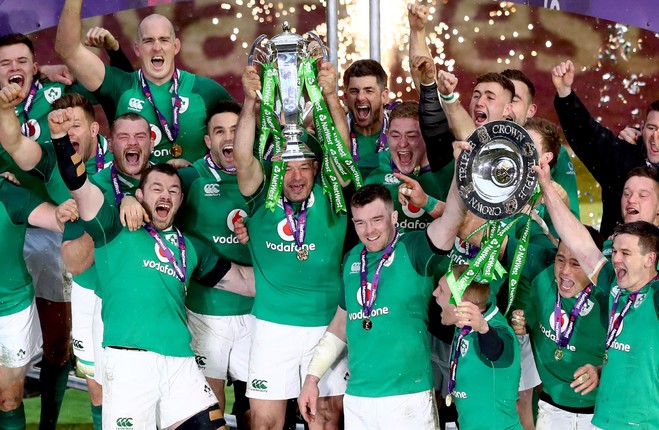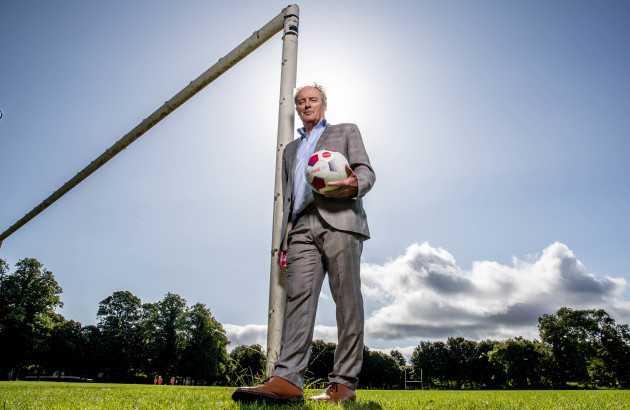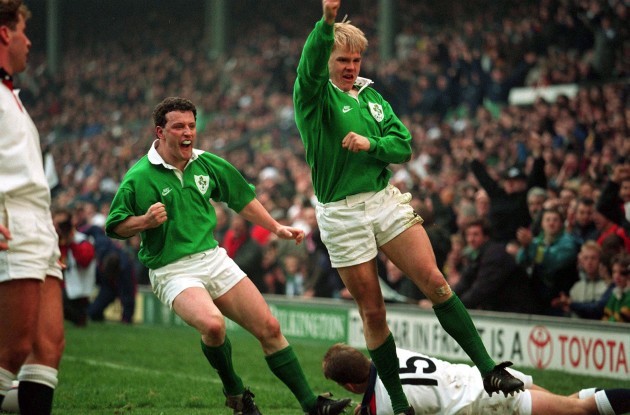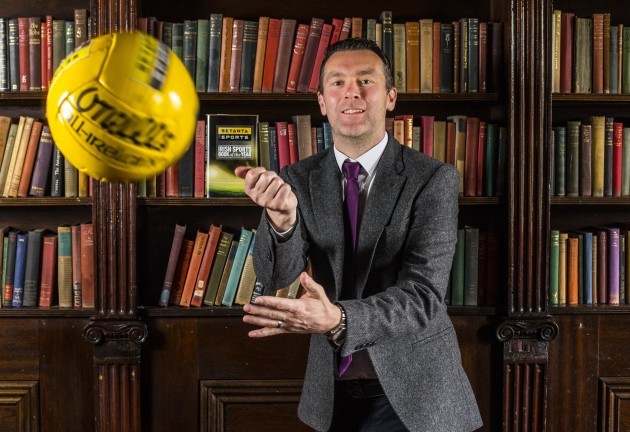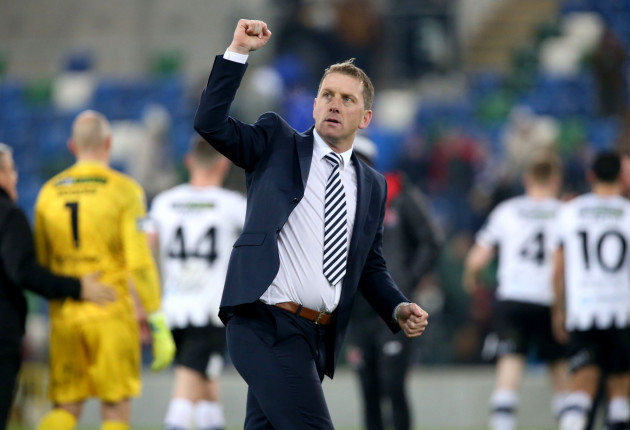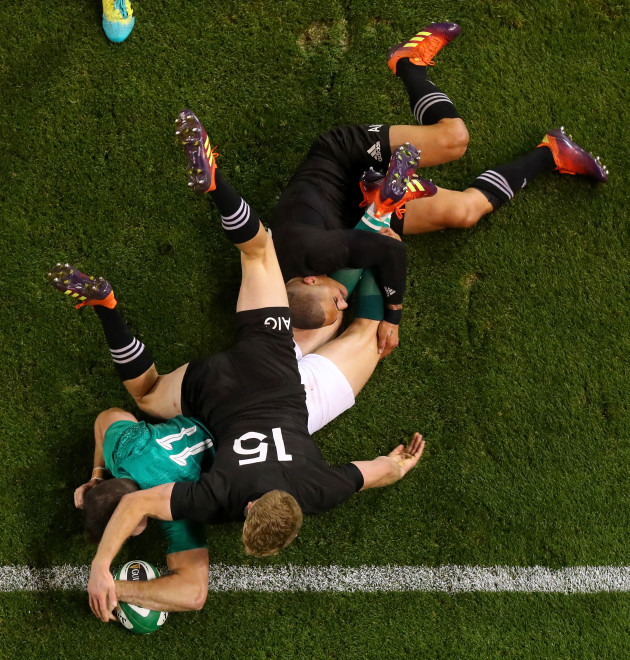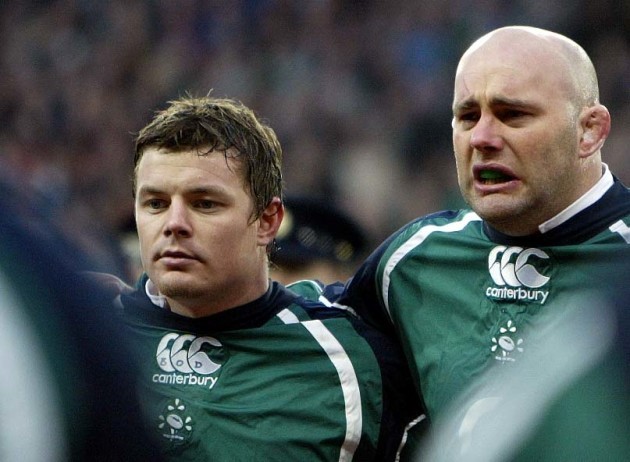SATURDAY AFTERNOON WAS the worst time of the week for Brian Kerr. Sundays were fine; mass just after the breakfast, then a match, home for the dinner, off out again to either Richmond Park, Dayler, Milltown or Croker.
But Saturdays did his head in. Not the mornings, because he was running a team then – 15-years-old and bitten already by the coaching bug. But Saturday afternoons! “Ah would ya stop.”
That’s why he liked February and the Five Nations, a chance to re-engage in this weird relationship he had with a sport that may have been beamed into his living room but still felt distant.
He loved it, then it left him, then a year later it’d find its way back into his heart. This was 1960s Ireland, a long time before Sky Sports was even created – just three soccer matches televised each year. But then, come the spring, all these rugby internationals appeared on screen.
Kerr had a ritual. Get the paper, check the TV listings; sit in for the afternoon. No programmes were scheduled either side of the matches. So no lead in; no group of guys sitting in a studio offering analysis. When the teams left the tunnel, the broadcast began and when the final whistle went, the screen went blank again until the Angelus came on at six o’clock.
And watching it all unfold was this quintessential football man, ‘fully engaged in it even though the team regularly played second fiddle to Wales, England and France’.
Ah, the French!
These long-haired fellas with their moustaches, colourful names and nice tans battering their way over our skinny, pale, freckled, little Irish fellas. We would get a big win every once in a while. You kept watching to see that.”
***
Oisin McConville didn’t see any big Irish victories until 1991 because the All-Ireland winning Gaelic footballer didn’t see any game of rugby at all until that year. Growing up in Crossmaglen – “inside a GAA bubble”, he didn’t even know that Dundalk, located just 10 miles away, had their own rugby club.
Then it happened, a Saturday afternoon, curtains drawn, TV on, eyes drawn to this blond-haired flier charging down the wing. “Like the nuances of the game, the tactics, they were beyond me at that stage,” McConville says. “But basically, my attitude was ‘would you just f**king give the ball to that fella. He’ll score every time’.”
***
Vinny Perth was also besotted by this mystery blonde. Simon Geoghegan just had that type of impact on people. If Brendan Mullins’ was Perth’s first hero – and Garry Ringrose his current one – then Geoghegan was that year’s love. “Right, what was it about the Six Nations for me,” the current Dundalk soccer manager, asks.
“Okay, it’s this. You’re eight years old, growing up in Tallaght. All you do is play sport; and if you don’t play it, you watch it.
“January comes, January goes. There’s nothing on TV. There were six channels in Ireland then; two Irish, four British. You get to February. This tournament begins. You listen to this Scottish voice (Bill McClaren’s) and it’s a sound you’ve never heard before. From then on in, you watch every game on BBC unless it’s Nigel Starmer-Smith commentating rather than McClaren. Only then do you go back to RTE.
“I loved the raw passion of his voice – and loved the raw passion of these age-old rivalries, a bunch of guys putting their bodies on the line for their country. It just seemed so pure. As I got older, other things intrigued me.
Like, I’m a football man, always will be. But I love the test match element to the Six Nations, the sheer importance of each fixture, the knowledge that if they lose, it’s a year before they can put that right. In a football context, for me a Six Nations game is on par with a European championship or World Cup finals match. It’s that intense.”
***
It wasn’t for Paul Howard. Like Kerr and Perth, the author also grew up in a working-class part of Dublin where rugby simply didn’t have a presence. Despite being part of the same generation as McConville and Perth, Ireland’s Triple Crown wins in 1982 and 1985 by-passed his home.
“To be a sports mad kid, growing up in the ‘80s, watching everything that’s going, athletics, cycling – football obviously – it’s kind of mad that I didn’t have any connection with rugby. But no one round our way did – apart from this one teacher at school, Seamus Moran was his name.
“He set up a team and we played Blackrock College in a friendly, got hammered, absolutely destroyed and when it got to the second-half, the score went past 100 points and the ref blew it up.
So for years and years, I genuinely believed rugby was this game where the first team to score 100 points was declared the winner! The sport meant absolutely nothing to me.”
**
Nor, for the first 23-years of her life, did it have any impact on Eimear Considine. Kilmihil, deep inside the GAA’s heartland in west Clare, was where she played Gaelic football and camogie, totally unaware Ireland even had a women’s rugby team.
And then, in 2013, with Ireland going for the grand slam in Italy, she sat down in the family kitchen, finished the Sunday dinner, switched on the television and became an immediate convert. Dishes were temporarily abandoned for a couple of hours, her eyes drawn to this match; Niamh Briggs’ match-winning penalty getting her off her feet. And that was that. Rugby had another believer; not just a fan but a future international.
**
You can see the themes, the power of television; the ability – and difficulty – people have in connecting with an Irish team and also this nagging question about whether the sport really does cross borders. Politically, there’s no question that it does. There’s no north/south divide like there is in soccer.
But socially? Does it reach across class boundaries into working-class housing estates? Does it sneak inside those GAA bubbles that McConville talked about?
“Well it didn’t when I was growing up in Crossmaglen,” McConville said. “We’re within Ulster but no one from the town would have gone to see the Ulster team. Not then.”
And what about now? “Yes, absolutely,” McConville says. “My son is a huge Ulster fan. I support Munster, but that’s a different story, down to the fact that when we (Armagh) were trying to get across the line to win our All-Ireland, they were also knocking repeatedly on the door. That struggle resonated with me. I really admired Ronan O’Gara, because when it came to clutch times in games, he delivered. Don’t get me wrong, I’d cheer for Ulster, too. But Leinster? Nah, I just can’t have them.”
Nor, for that matter, can Howard. After belatedly discovering that rugby wasn’t a game determined by the first team to reach the 100-point mark, he would become increasingly intrigued by it, first through his work as an award winning sports journalist, more recently by the brilliance of his best-selling Ross O’Carroll Kelly books.
The country’s finest satirist still isn’t a rugby fan but understands those who are. “Aesthetically it’s pleasing, fascinating even, to see a team weave clever patterns of play by moving the ball backwards in order to go forwards,” Howard says.
But truthfully, I just can’t handle the bonus point system. It’s hateful. That’s sport for accountants. That’s some bore saying, ‘let’s make sport like homework’. For me, there are just too many stoppages, too many rules, in it. I’d be lying if I said I’ll get emotionally involved in this Six Nations.”
Perth will, though. In between the challenges of preparing his Dundalk squad for the defence of their League of Ireland title, and the endless conversations with agents, players and owners, he’ll find time – either late at night or early in the morning – to watch all 15 games in this year’s tournament. “I can be a bit of a sports nerd. Like, the most interesting rugby game I ever saw was when Italy went to Twickenham in 2017 and didn’t contest any rucks. I was looking at that going ‘wow! Why has no one else ever tried that’?”
It isn’t the only question he asks about the sport. The biggest one is how and why he never once played it. “It’s a huge frustration; in fact I’d go as far to say it’s one of my biggest sporting regrets. There is so much about it; the aggression, the skill but particularly the tactical element that just makes me want to keep tuning in.
“Soccer can learn so much from it. Like if you’re being truthful, rugby is a small enough sport in global terms but it has always set the trends; with its analytics, video work, GPS work. In our sport, for so long, it was 4-4-2 versus 4-4-2.
“Years and years ago, if you’d told (soccer) players to turn up for team meetings with a notepad and a pen, they’d have laughed. But in rugby, that was standard practice from way back. It’s a sport that suits the academic type but I’m not buying this argument that it is a game for snobs.
“When I look at the rugby schools system in this country, my first thought is ‘can soccer learn from this?’ To become world class, you need to create an elitist culture. It gets the best out of people.”
Nevertheless, rugby people are increasingly sensitive about the whole private school discussion. Every time it is mentioned, you immediately hear about Tadhg Furlong or Sean O’Brien; Alan Quinlan, John Hayes or a couple of dozen more who came up via a different route.
But for those floating voters who dip in and out of the sport, strong views exist.
These are Kerr’s thoughts: “Whether they like it or not, the fact is that a small number of elite schools have an incredible system in place that produces players. I envy it to a degree where kids can aspire to become an international player, dedicate huge number of hours to their preferred sport but can have it both ways. By pursuing a sporting dream, they don’t have to allow their studies to decline.”
And here is Howard: “Take the Ireland team who beat New Zealand. Basically that came down to about 10 schools producing those players. You’re not talking about a catchment area of 500 schools, you’re talking about 10 PE teachers showing these players how to develop their skills and beat the best team in the world. That’s incredible.”
Something else is too. Television will bring today’s game against Scotland into the homes of over 700,000 people in this country and if the tournament goes well, by the time they rock up in Paris for their concluding game against France, the peak audience may rise to over a million. Out of the 20 most watched programmes on Irish TV across the last two years, seven have been rugby internationals.
Yet it doesn’t come close to soccer or GAA in terms of participation. “No, soccer remains the most popular,” Kerr says. “But rugby has grown. The casual sports fan seems to be able to easily engage with these articulate, intelligent, young players and then, when the Six Nations tournament is over, go back to other sports.”
Here’s McConville again: “Rugby’s had a strange impact on my life. From having never once watched a match until I was about 16, there became a stage when I wouldn’t miss a game under any circumstances. Like by the time of that Croke Park game, against England (in 2007), I just had to be there. No discussion. Get me tickets. That was it.
“Seeing the tears run down John Hayes’ face when our anthem was played that day, the tension surrounding God Save the Queen; the silence and respect for it; I’ll never forget it. The pressure on the Irish players that day must have been f***ing insane. Then Ronan O’Gara does a crosskick and this big fecker from Meath catches it in the air, scores a try. You’re thinking; someone up there is scripting this. It was a great day in our country’s history.”
Brian Kerr: “It definitely brought more people towards it. Traditionally rugby was seen as the posh boys’ game but the redevelopment of their stadium required a degree of humility on their behalf to go to the GAA and reach out for help. The 2007 game against England brought the sport to a wider audience.
“In the past GAA people may have viewed rugby as a competitor, but to see it go to their stadium, see them go up against countries with bigger populations, England and France, and consistently do well; I’m sure GAA people could identify with that.”
Paul Howard: “Truthfully, I still struggle to identify with it. I watch about eight games a year – although I know things have changed definitely. My nephews are growing up in the same estate that I lived in as a kid and they’re mad into it. The sport has grown – it’s just that it hasn’t grown that much on me.”
For so many others, it has. We have seen the transformation, the shift – the game entering homes it never used to, albeit often on just a seven-week lease.
And that’s just it ……. for some its love, for the remainder just a little fling that gets them through February.
